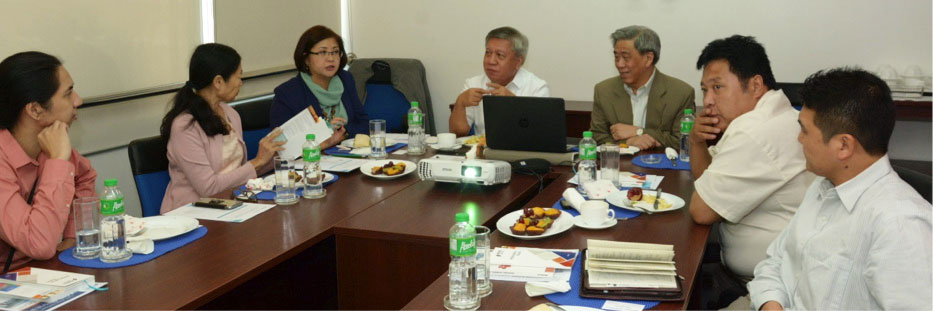
Chimi Dorje, Chief Administrator and Tashi Dendup, Accounts Officer of the of The Royal Government of Bhutan Alternative Dispute Resolution Center (ADRC), visited PDRC on May 24, 2018 as part of their study tour in the Philippines. They were accompanied by Jennifer Catindig and Theo Alec Marcelino, President and team member, respectively of Paibare Legacy Corps, Inc.
Mr. Dorje explained that they visited the Philippines instead of countries nearer to Bhutan because Filipinos spoke English well and they found it easier to communicate. He said that ADRC was recently established in 2013 and they wanted to learn more about the Philippine experience on ADR and to learn the best practices of an ADR organization like PDRC.
The Bhutanese delegation was welcomed by Francisco Pabilla, Jr., PDRC Assistant Secretary General and Bamba Parungao, Administrative Officer. Atty. Edmundo Tan, PDRC President, also came to meet with the delegation. Following the slide presentation by Mr. Pabilla on PDRC as an ADR service provider, the delegation toured and took pictures of the PDRC premises.
The Bhutanese delegation expressed their appreciation of the warm welcome from PDRC. Mr. Dorje said that since ADRC still has a lot to learn, ADRC may invite PDRC in the future to come to Bhutan to conduct training on ADR and arbitration.
Summary judgments in arbitration
PART 1
Litigators are quite familiar with the procedural remedy of a summar y judgment, where one or both parties may move for a judgment on the merits if there is no substantial disagreement on the facts and either or both parties believe that they are entitled to a favorable judgment based on the applicable law. If the court agrees with the movant and renders a summar y judgment, it avoids a trial on the merits and saves the parties, especially the applicant, the time, expense and resources that would have been expended in presenting its evidence on a protracted trial.
For example, if a borrower files a case to set aside the foreclosure of a real estate mortgage by reason of undisclosed loan interests charged by the bank, the lending bank may raise the defense that the borrower signed a bank disclosure statement showing the breakdown of interests charged on the loan. If the borrower argues that he did not read the disclosure statement, the bank may respond that it was the borrower’s duty to read the disclosure statement and, on that ground, move for a summar y judgment.
The court is not always bound to render a summar y judgment, however. It may refuse the motion af ter summarily hearing the evidence of the parties. In the same example, the court may deny summar y judgment if the evidence during the hearing shows that there were unexplained erasures and insertions on the bank’s copy of the disclosure statement that was used as basis of the mortgage foreclosure. The presence of intercalations will result in additional questions of fact that may be best resolved af ter a full-blown trial.
Under Rule 35, Sec. 3 of the 1997 Rules of Civil Procedure, Philippine courts must “forthwith” render a summar y judgment upon motion by a party if, af ter hearing the parties 10 days af ter the application, “the pleadings, supporting affidavits, depositions, and admissions on file, show that, except as to the amount of damages, there is no genuine issue as to any material fact and that the moving party is entitled to a judgment as a matter of law.” The remedy is an effective tool in removing patently unmeritorious claims or defenses.
Application of summary judgment in Philippine arbitration
Most arbitral institutions, the Philippine Dispute Resolution Center (PDRC) included, do not have a rule expressly allowing summar y judgments. The closest to a summar y judgment under existing arbitration laws and rules in the Philippines are the (a) proceeding in lieu of a hearing under Section 18 of The Arbitration Law, and (b) expedited procedure under institutional rules.
Proceeding in lieu of hearing
Section 18 of Republic Act 876 (1953), The Arbitration Law, allows the parties to agree in writing to submit their dispute to arbitration by other than oral hearing. The parties may submit an agreed statement of facts, together with all documentar y proof, and their respective contentions and reply statements and proofs, af ter which the arbitrators shall declare the proceeding in lieu of hearing closed.
This procedure requires a prior written agreement between the parties and is, in reality, an abbreviated hearing on the merits. Where the parties do not agree to a proceeding in lieu of oral hearing, the tribunal may not waive the parties’ right to an oral hearing under Section 12 of The Arbitration Law, in case of domestic arbitration, and under Article 24 (1) of the Model Law in case of international arbitration, if a hearing is requested by a party. Only if none of the parties requests a hearing, which is rare, may the tribunal in an international arbitration decide to forego oral hearings and to conduct the arbitration on the basis of documents and other materials only.
Expedited procedure
In 2015, PDRC revised its Arbitration Rules to include an expedited procedure in Article 52, upon application of a party, if the claim does not exceed P25,000,000 or in case of “exceptional urgency.” The expedited procedure also applies where the parties “so agree.”
Where the application for expedited procedure is granted by PDRC, it will appoint a sole arbitrator or, if the agreement provides for three arbitrators, it will invite the parties to agree to a sole arbitrator. PDRC may also shorten the time limits provided in the Arbitration Rules.
The tribunal shall then adopt a simplified procedure to expedite the arbitration, including shorter time limits for submission of evidence and documents, and decide the dispute on the basis of documents and other materials only. The award shall be made within six months from submission of the case file to the tribunal and may state in summar y form the reasons upon which the
award is made.
Concerns with summary judgment
In the absence of an express rule allowing summar y judgments, arbitrators are reluctant to allow an application for a summar y award because of the equal treatment principle under Article 18 of the Model Law, which requires the tribunal to treat the parties “with equality” and to give them “a full opportunity” to present their case.
Since Article 18 of the Model Law applies to both domestic and international arbitration under Sections 19 and 32 of Republic Act 9285, The Alternative Dispute Resolution Act of 2004, a summary judgment rendered by the tribunal may be vacated on this ground under The Arbitration Law, in case of domestic arbitration, or set aside under the New York Convention, in case of international arbitration.

